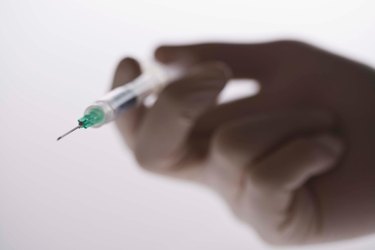
People usually use performance-enhancing drugs to boost athletic performance. While drugs such as anabolic-androgenic steroids, growth hormones, stimulants and diuretics may help certain people attain short-term physical goals related to muscle building, speed, strength or weight management, these drugs may also have serious side effects. Liver problems, cardiovascular effects, emotional instability and severe dehydration are several well-known effects of some performance-enhancing drugs.
Anabolic and Growth Effects
Video of the Day
Certain performance-enhancing drugs have anabolic effects, meaning they promote the building of muscle. Synthetic anabolic-androgenic steroids such as oxandrolone and methyltestosterone are known to promote the growth of skeletal muscle, according to the Mayo Clinic. Although they promote muscle growth, they can stunt overall growth and development, particularly when used by adolescents and teenagers.
Video of the Day
Undesirable Gender Effects
Certain performance-enhancing drugs can cause undesirable physical changes to both men and women. According to the Mayo Clinic, anabolic-androgenic steroids can cause men to develop shrunken testicles, prominent breasts, reduced sperm count or infertility and baldness, while women may develop an unusually deep voice, excess body hair, an enlarged clitoris, irregularities in their menstrual cycle and baldness.
Dehydration
According to the Mayo Clinic, diuretics such as furosemide and spironolactone are sometimes used to cause a significant amount of weight loss in a very short period of time or to mask the use of other drugs. Because they flush excess fluid from the body, however, they can also cause severe dehydration. Dehydration can cause a number of other potentially dangerous side effects, including electrolyte imbalances such as potassium deficiency, muscle cramps, dizziness, extremely low blood pressure, exhaustion and heart problems. If left untreated, these conditions can be fatal.
Cardiovascular Effects
According to the Office of National Drug Control Policy, oral and injectable anabolic steroid abuse is associated with increased risk of high blood pressure, heart attack and stroke. The use of growth hormones such as human chorionic gonadotropin and corticotrophin can cause diabetes, which also increases the risk of cardiovascular problems. The use of diuretics can also cause heart arrhythmias.
Emotional Effects
Anabolic-androgenic steroids can cause severe rage, aggressive outbursts or violence. They may also induce the onset of psychiatric disorders such as depression. According to the Partnership for a Drug-Free America, research has shown that steroids can also cause delusions such as beliefs of invincibility, paranoid jealousy, excessive irritability and moodiness and impaired judgment. According to the Office of National Drug Control Policy, narcotics or painkillers are sometimes used to produce feelings of euphoria and invincibility. While they may be psychologically stimulating, they can cause delusional beliefs about an athlete's physical prowess and abilities that lead him to act in reckless ways. Additionally, while stimulants such as ephedrine and amphetamines can increase alertness and reduce feelings of fatigue, they are also known to cause poor judgment and increased hostility.
Effects on the Liver
Anabolic-androgenic steroid use can cause severe damage to the liver. According to the Partnership for a Drug-Free America, steroid use can increase the risk for developing liver tumors. Damage to the liver can impair its functioning, leading to other major health problems such as edema, or swelling in the legs, arms and/or abdomen, and jaundice--a condition characterized by a yellowing of the skin and whites of the eyes. Jaundice can be caused by hepatitis--a disease of the liver that may be contracted from others through anabolic steroid injections or may be a side effect of large amounts of the drugs themselves, according to the Mayo Clinic. These liver conditions can cause fatigue, loss of appetite, abdominal pain, nausea and vomiting, and may lead to liver failure if the drugs are not stopped before they lead severe, irreversible damage.
High doses of the supplement creatine can also cause liver and kidney damage, according to the Mayo Clinic.